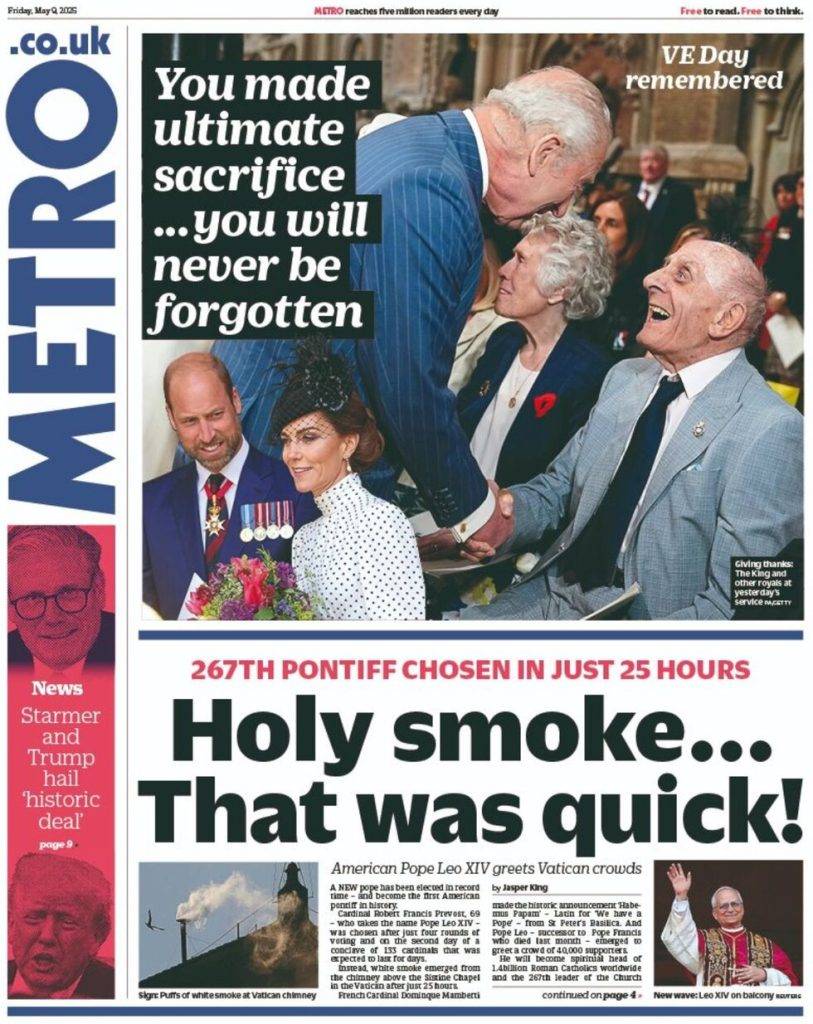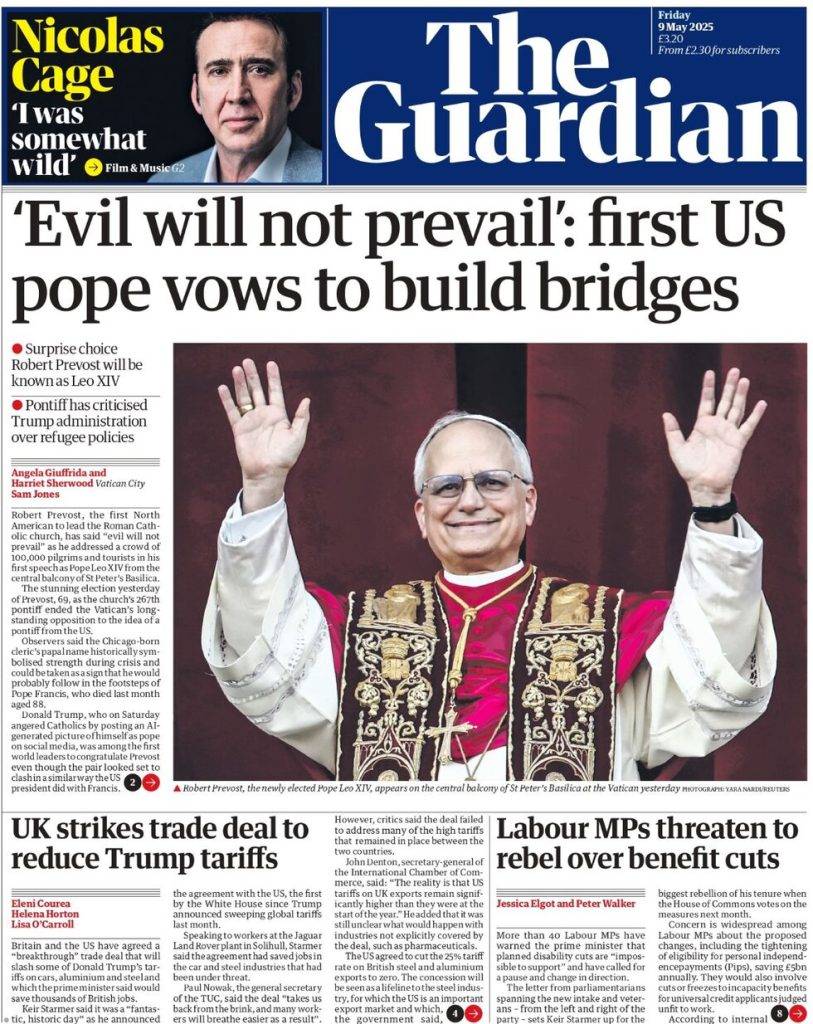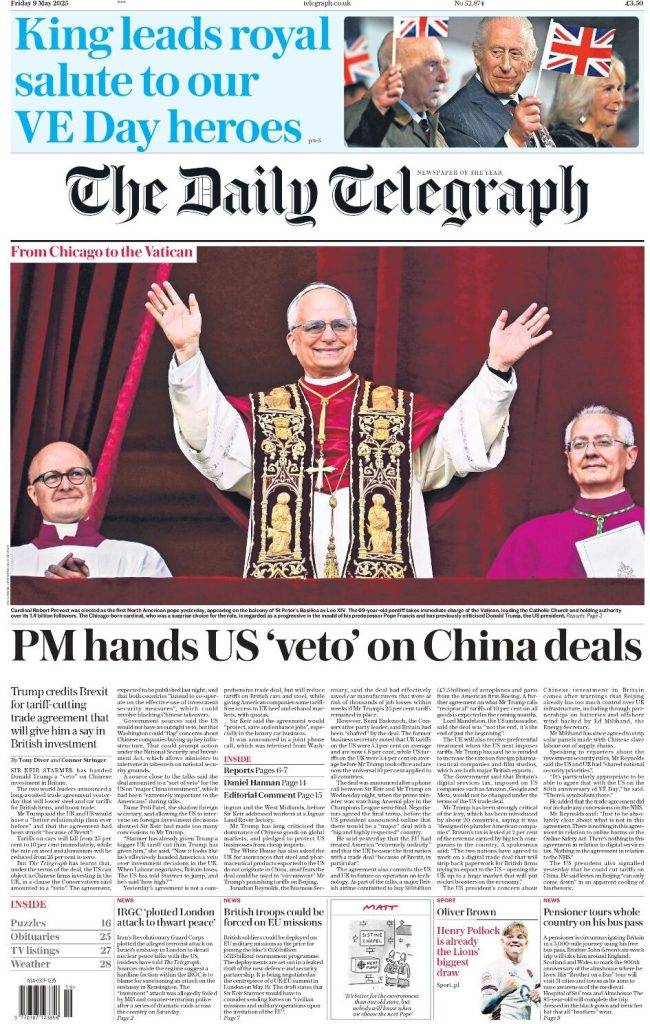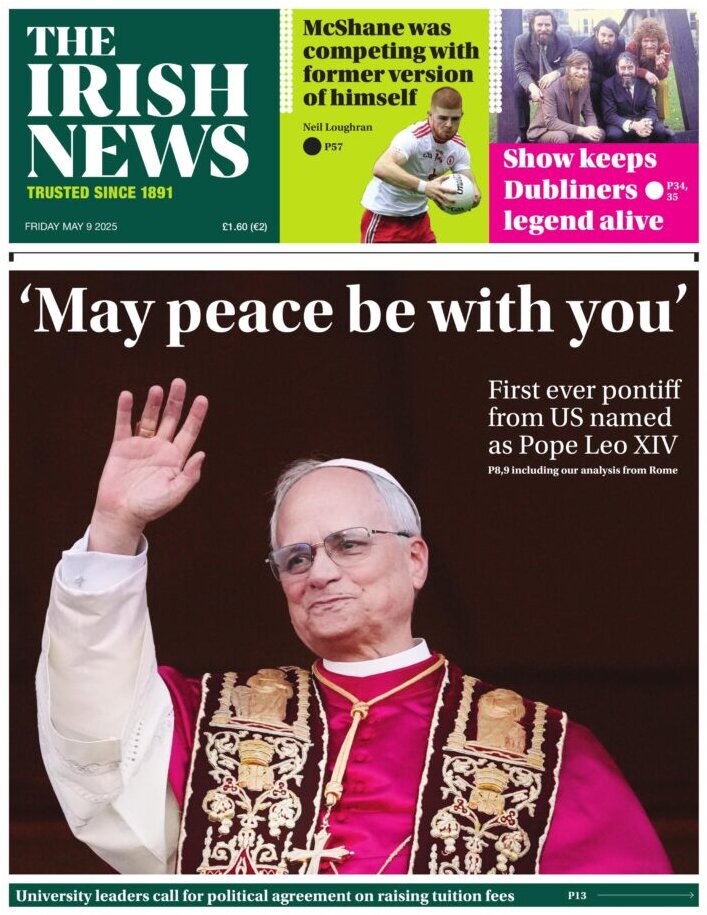- UK Government Mulls X Block due to Grok AI Image Concerns
- Wingsuit pilot dies after 1,000ft mountain dive at 120mph
- US Forces Boldly Capture Russian-Flagged Oil Tanker Marinera in Atlantic
- US Spy Planes Gathering at RAF Bases in the UK
- UK Faces Heavy Snowfall as Storm Goretti Hits: What to Expect
- Who is Delcy Rodriguez, the Trump-supported new leader of Venezuela?
- Urgent hunt for Brit who disappeared in Thailand after video call with family
- Heavy Snowfall Leads to Widespread School Closures
Tennis-playing American – Pope Leo XIV appointed | Paper Talk UK
Bias Exposure
Many of the UK newspaper front pages leave space to report on the announcement that US-born Robert Prevost has been elected as the next pope following the death of Pope Francis on Easter Monday.
The new pope, who also holds Peru citizenship, will deliver his first mass today. World leaders are welcoming the pope in his new role – everyone except Donald Trump’s right-wing supporters – who aren’t happy that the new pope has been openly critical of Trump, and is seen as a bit of a ‘lefty looney’. It’s the same reason they didn’t like Pope Francis either.
In Britain, Europe and the rest of the world, the new Pope has received a warm welcome.
Daily Mail says the appointment was a “stunning surprise” not just because he’s the first US-born to become the successor of St Peter but Catholic traditionalists were “confident” that after the “radical turbulence of Pope Francis’s 12-year reign” the cardinals wanted to move away from the progressive.
EXPLAINER
Attention-grabbing phrasing – “Tennis-playing” adds an unexpected, casual detail, making the headline stand out but also potentially distracting from the main point.
Contradictory imagery – The combination of “White House critic” and “first American Pope” presents an unusual contrast, blending political dissent with religious achievement, which could intrigue readers.
Emphasis on personal traits – The headline highlights personal qualities like “Tennis-playing” and “White House critic”, focusing on individual identity rather than the significance of the event itself.
Polarising language – Describing someone as a “White House critic” positions them in opposition to a powerful institution, potentially creating a divisive tone.
Surprise element – The phrase “first American Pope” is framed as an unexpected milestone, heightening interest through novelty.
Simplification of complex issues – The headline simplifies the significance of both the individual’s career and the event, potentially leaving out more nuanced or critical aspects.

Metro says the Chicago-born prelate was chosen after four rounds of voting on the second day of a conclave comprising a record 133 cardinals that was expected by some Vatican watchers to last days.
EXPLAINER
Sensationalism – “Holy smoke … That was quick!” uses casual, dramatic language to heighten the sense of surprise and urgency, making the event seem unusually fast-paced.
Informal tone – The phrase “Holy smoke” adds a playful, colloquial touch, which contrasts with the gravity of the subject, potentially undermining the seriousness of the event.
Exaggeration – The phrase “That was quick!” simplifies the process and implies that the speed of the decision is extraordinary, though without context or explanation.
Puns and wordplay – The use of “Holy smoke” adds humour or lightness, which may detract from the weight of choosing a new pontiff.
Focus on speed – The headline prioritises the speed of the selection (“in just 25 hours”) rather than the significance or process of the election itself, which may skew the reader’s understanding of the event.
Lack of context – There is no explanation of why the choice was made so quickly or its impact, leaving the headline open to interpretation and potentially misleading readers about the situation.

The Guardian says Robert Prevost, the first US cleric to lead the Roman Catholic church, has said “evil will not prevail” as he addressed a crowd of 100,000 pilgrims and tourists in his first speech as Pope Leo XIV from the central balcony of St Peter’s Basilica.
EXPLAINER
Emotive language – “Evil will not prevail” uses strong, moralistic language to position the Pope as a figure of righteousness and a protector against wrongdoing.
Dramatic tone – The phrase “Evil will not prevail” evokes a sense of conflict and urgency, setting the stage for a dramatic clash between good and evil.
Moral framing – The headline frames the Pope’s mission in terms of high moral stakes, implying that the success of his efforts is critical to defeating evil.
Focus on identity – “First US pope” highlights his nationality as a significant detail, possibly introducing a sense of novelty or uniqueness.
Action-oriented language – “Vows to build bridges” suggests a positive, constructive approach, focusing on reconciliation and peace, which can evoke hope and optimism.
Simplification of religious and political issues – The headline reduces the complexities of the Pope’s role and broader political or religious dynamics into easily digestible terms, potentially omitting nuanced details.

The Daily Telegraph says Pope Leo, the first ever American Pope, began his ministry by laying before the world a vision of peace and explaining how humanity needs the good things and the peace that God gives us in Jesus Christ: and also calling for unity; unity within and between the churches, in our world and with all people of goodwill…
EXPLAINER
Emotive language – “In God We Trust” invokes religious sentiment, strongly associating the new pope with faith and divine authority.
National pride – “New pope is an American” highlights the Pope’s nationality, emphasising the significance of the first American Pope in a religious institution traditionally led by Europeans.
Patriotic undertones – The headline subtly appeals to American readers’ national pride, positioning the pope’s election as a victory for the United States.
Religious symbolism – “In God We Trust” is a slogan deeply tied to American identity, aligning faith with national values, while also reinforcing the religious importance of the papacy.
Simplification of religious and political complexities – The headline focuses on nationality and faith, potentially reducing the complexities of papal selection and the broader religious role of the pope.
Framing for impact – The juxtaposition of a national slogan with a significant religious role creates a headline that connects two powerful identities: American patriotism and Catholic faith.

The Irish News says Chicago-born Cardinal Robert Prevost will forever now be known as Pope Leo XIV. At 69 years old, he is seven years younger than Pope Francis was when he was elected.
Some had speculated that cardinals might not choose such a young – by the standards of pope – new leader whose reign was likely to be lengthy.
EXPLAINER
Religious language – “May peace be with you” is a traditional, calming phrase used in religious contexts, evoking a sense of serenity and goodwill.
Historical significance – “First ever pontiff from US” highlights the uniqueness of this event, emphasising the novelty of an American becoming Pope.
Moral and spiritual framing – The use of “May peace be with you” and the mention of the papal role suggests a focus on peace and spiritual leadership, aligning the Pope with positive, unifying values.
Solemn tone – The headline takes on a reverent and respectful tone, emphasising the gravity of the event while also highlighting the historical achievement.
Name symbolism – “Pope Leo XIV” connects the new pontiff to a legacy of previous Popes named Leo, which may invoke feelings of continuity and tradition, despite the novelty of his American heritage.
Simplification of complexity – While the headline highlights the historical nature of the event, it oversimplifies the broader political, religious, and cultural implications of having an American Pope.

Subscribe to Updates
Get the latest creative news from FooBar about art, design and business.

